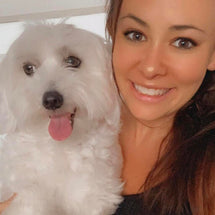Why Does My Dog's Farts Smell Like Rotten Eggs?

We all love our dogs, but let’s face it, dog gas can be pretty stinky! If you’ve noticed that your dog's flatulence smells different from time to time, you might be wondering why.
Ever thought, 'Why does my dog's farts smell like rotten eggs?' Understanding the cause of these smells can help you figure out how to reduce the stink and keep your pup’s digestive system healthy.
So What Should Dog’s Flatulence Smell Like?
A healthy dog's 'wind' should have a mild or barely noticeable odour, with any smell being slight and not overpowering. It's normal for dogs to have occasional slightly smelly gas, especially after eating certain dog foods or if they’ve swallowed air while eating quickly. However, if your dog’s gas is consistently strong or unpleasant, it could indicate a dietary issue, poor digestion, or a potential health concern that may need to be addressed.

The Different Smells and What They Mean
1. Rotten Egg Smell:
- What It Is: This smell usually comes from hydrogen sulphide, a gas produced when your dog’s body breaks down sulphur-containing foods.
- Common Culprits: Foods like eggs, certain meats, and vegetables like broccoli and cauliflower.
-
What It Means: If your dog’s gas has a rotten egg smell, it could mean they’re eating a lot of sulphur-rich foods, or they might have trouble digesting these foods properly.
2. Foul, Pungent Smell:
- What It Is: A strong, unpleasant odour often linked to foods that are hard for your dog to digest or that don’t agree with their system.
- Common Culprits: Dairy products, beans, or high-fat foods.
-
What It Means: This could indicate a food intolerance or an imbalance in gut bacteria. If your dog’s gas has consistently foul-smelling, it might be worth looking into their diet or checking if they’ve eaten something they shouldn’t have.
3. Sweet or Fermented Smell:
- What It Is: This smell might come from carbohydrates that aren’t being digested properly, leading to fermentation in the gut.
- Common Culprits: Foods high in sugar or certain fibres.
-
What It Means: Your dog might be eating too many carbs or having trouble digesting certain sugars. This could also suggest an overgrowth of certain bacteria in the gut.
4. Metallic or Ammonia-Like Smell:
- What It Is: A metallic or ammonia-like smell could result from the breakdown of protein in the gut or the presence of blood in the digestive tract.
- Common Culprits: High-protein diets or potential gastrointestinal issues.
-
What It Means: This smell could be a sign of a more serious issue, such as gastrointestinal bleeding or liver problems, and should be checked by a vet immediately.
5. Fishy Smell:
- What It Is: This smell can be related to fish-based foods or issues with the dog’s anal glands.
- Common Culprits: Fish-based diets or anal gland problems.
-
What It Means: If your dog isn’t eating fish but their wind smell fishy, it might indicate anal gland issues that need veterinary attention.
6. Musty or Earthy Smell:
- What It Is: A musty or earthy smell might be due to certain bacteria or yeast in the gut.
- Common Culprits: Yeast overgrowth or an imbalance in gut flora.
- What It Means: This could suggest a yeast infection or other gut flora imbalances, possibly requiring dietary adjustments or probiotics.
How to Resolve the Stinky Situation
If your dog’s flatulence are becoming a bit too much to handle, here are some tips to help reduce the smell:
Check Their Diet:
Make sure your dog is eating a balanced diet appropriate for their age, size, and breed. Avoid feeding them too many high-sulphur foods (High Protein, Eggs, Cruciferous Vegetables, Dairy) or anything that might be hard for them to digest.
Gradually Introduce New Foods:
If you’re switching your dog’s food, do it gradually to give their digestive system time to adjust. Sudden changes can upset their stomach and lead to gas.
Monitor Their Health:
If the smell of your dog’s flatulence changes suddenly or they start showing other symptoms like diarrhoea, vomiting, or changes in appetite, it might be time to visit the vet. There could be an underlying health issue that needs attention.
Probiotics and Digestive Enzymes:
Consider adding probiotics or digestive enzymes to your dog’s diet. These can help balance their gut bacteria and improve digestion, which can reduce gas.
Regular Exercise:
Keeping your dog active can help their digestive system work more efficiently, which can reduce gas.
Avoid Table Scraps:
Human food can be hard for dogs to digest and can lead to smelly gas. Stick to dog-appropriate treats and avoid feeding them from your plate.
Using a Slow Feeder:
Using a slow feeder or raising your dog's food bowl can help reduce flatulence by promoting better digestion and minimizing the amount of air your dog swallows while eating. Slow feeders are designed to make your dog eat more slowly, which reduces gulping and prevents excess air from entering the digestive system—a common cause of gas. Similarly, raising the food bowl to a comfortable height can improve digestion by aligning the dog's oesophagus and stomach, making it easier for food to pass smoothly and reducing the likelihood of gas build-up.

Understanding the different smells of your dog’s gas can give you insight into their health and diet. By making a few adjustments, you can help reduce the smell and keep your dog’s digestive system running smoothly, and if the stink persists, don’t hesitate to consult your vet to make sure everything is okay with your dog!






